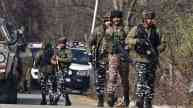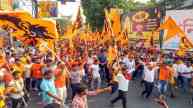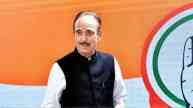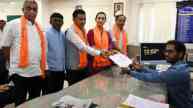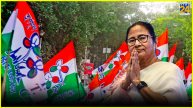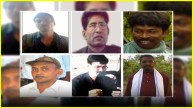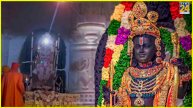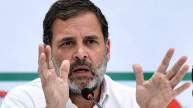My recent article, ‘Five Nehruvian Blunders of Kashmir,’ on the country’s first Prime Minister, Pandit Jawaharlal Nehru’s ‘five blunders’ on Kashmir, elicited a wide range of responses. I wrote, among other things, that Maharaja Hari Singh’s government wanted to join India before August 15, 1947, but Nehru refused. This claim was based solely on statements made by Nehru himself.
Dr. Karan Singh’s response to my article is extremely disappointing in this context. He cited Nehru’s other four gaffes: insisting on temporary accession, taking the matter to the United Nations under the wrong article after Pakistan’s invasion, making him a party to the dispute rather than the aggressor, as mandated by the UN. Perpetuating the referendum myth and completely abandoning the contentious Article 370.
Obviously, there was no answer or way out, but Nehru’s first and foremost error – delaying accession by Nehru himself… However, Dr. Karan Singh has created a fabricated history and poorly worded Took support. That, too, was done to exonerate Nehru in some way, but it was insufficient for the Congress.
What really happened? Why did Pt. Jawaharlal Nehru delay the accession of Kashmir into India and thereby give Pakistan an opportunity to invade it?
I write in @CNNnews18 on the real story behind Nehru’s “Panch-Bhool” or 5 Blunders on Kashmir. 1/2 https://t.co/Wr1Qx7oVXE
— Kiren Rijiju (मोदी का परिवार) (@KirenRijiju) November 14, 2022
Dr. Karan Singh’s lifelong devotion to Nehru, despite overwhelming evidence of his errors, could not save him from being bitterly reminded of his status by Jairam Ramesh of the Congress.
It is well known that the Congress and its ruling dynasty prioritised Nehru (the later members of the dynasty) over India, but the time has come for historians to correct history in light of facts. To make Nehru look good, muster the courage to clear the names of those who have been unfairly maligned by family historians.
Here is a brief set of facts for the specific points raised
At the time of merger
Nehru’s speech in the Lok Sabha on July 24, 1952 should be decisive in this regard. Wherein he mentioned that the question of merger ‘came up to us informally about July or mid-July’ and added that there we had contacts with the popular organization National Conference and its leader and the Maharaja’s government. Nehru then stressed his own stand in the same speech, ‘We had advised both that Kashmir is a special case and it would not be right or proper to try to do things in a hurry there.’ Circumstantial methods have been resorted to, so let us look at further primary as well as corroborative evidence.
First, in a letter to the Prime Minister of Kashmir, MC Mahajan, on October 21, 1947, Nehru stated, ‘It would probably be undesirable to announce any affiliation to the Indian Union at this stage.’ What is the meaning of these words? Who was pushing for the merger and who was opposing it? On October 20, 1947, Pakistan invaded Kashmir. On October 21, Nehru was still advising the Government of Kashmir not to join India until his personal desires and agenda were met (which is clearly mentioned in the letter.) Will this evidence be rejected as well?
Second, while the issue was still being debated at the international level, Nehru stated in a speech to Parliament on November 25, 1947, “We did not want just a merger from above, but a merger according to the will of his people.” In fact, we discouraged any hasty decision.
It is as clear as day that Nehru himself stated on several occasions who was putting conditions on the merger and thus deferring it until the personal agenda was met, but it did not happen. It is not the only evidence, but there is more than enough to shed light on the sequence of events.
Third, in May 1947, the President of the Indian National Congress, Acharya Kriplani, visited Kashmir. According to a report published in The Tribune on May 20, 1947, ‘Hari Singh was eager to accede to India and to raise the demand of ‘Quit Kashmir’ on behalf of the National Conference against Hari Singh was incorrect.’ He specifically asked the National Conference to drop the ‘Quit Kashmir’ demand, claiming that ‘he is not an outsider’.
Sheikh Abdullah launched the “Quit Kashmir” movement in 1946. This movement had received Nehru’s support. Hari Singh, a Dogra king, was not an outsider in Kashmir and had the same rights as everyone else. Every other Congress leader recognised the absurdity of reiterating the ‘Quit India’ campaign against the colonial British with the ‘Quit Kashmir’ campaign against the Kashmiri Hindu ruler. Nonetheless, Nehru strongly supported Abdullah and even travelled to Kashmir to do so. This set off a chain of events that would have tragic consequences for decades.
Hari Singh, as Vice-Chancellor of the Chamber of Princes in the House of Lords, stated during the Round Table Conference in London in early 1931, “I am an Indian first, and a Maharaja second.” On several occasions, he begged to join India, but was turned down until Nehru’s agenda was met.
Fourth, Nehru’s note to Lord Mountbatten before his visit to Kashmir in June 1947 is clear on what Hari Singh really wanted. Nehru wrote in paragraph 28 of that note – ‘There appears to be a general and clear desire of Kashmir to join the Constituent Assembly of India. This would satisfy both the popular demand and the Maharaja’s wish.’ So in June 1947, Nehru was fully aware of what Hari Singh really wanted. The only obstacle in this was Nehru’s own personal agenda.
Fifth, the merger attempt in July 1947 was rejected by Nehru. Hari Singh also made an attempt in September 1947, a month before the invasion of Pakistan. Mahajan, the prime minister of Kashmir at the time of the merger, recalls his meeting with Nehru in September 1947. Writing in his autobiography, Mahajan says, ‘I also met Pandit Jawaharlal Nehru, the Prime Minister of India… The Maharaja was ready to join India and also to bring about necessary reforms in the administration of the state. However, he wanted the questions of administrative reforms to be taken up later. Panditji wanted immediate changes in the internal administration of the state.
Thus we see that not once but on several occasions, Nehru’s statements and letters written by Nehru, with corroborative evidence, clearly establish the fact that the only reason for the delay in the accession of Kashmir to India was Nehru’s own personal It was a craze.
What actually happened
Abdullah demanded ‘Quit Kashmir’ in May 1946. Hari Singh got him arrested on 20 May 1946. After this Nehru went to Kashmir to support Abdullah, but Hari Singh took him into custody at the border. Nehru’s reaction after being taken into custody was recorded by a close aide of him: ‘He angrily stomped his feet on the ground and said that one day the Maharaja of Kashmir felt disrespectful towards the elected President of the Indian National Congress. You will have to show remorse and apologise.’ Nehru was furious and chose his time mercilessly to avenge this absurdity.
Events of 1947
In May 1947, Kriplani insisted on joining India, abandoning the demand for ‘Quit Kashmir’. Hari Singh also wanted the same thing, but it could not happen.
Nehru knew even in June 1947 that Hari Singh also wanted to join the Indian Union. Nehru has also mentioned this in the letters written by Mountbatten.
Hari Singh’s government approached the Indian leadership in July 1947 (according to Nehru’s own statement) to join India, but this was rejected by Nehru. Public support was not a condition for any other princely state to approve the merger with India. It was neither legally required to do so, nor was anyone compelled to do so. Nehru did this only for Kashmir, so that the merger could be postponed until Abdullah’s demand was met.
Even after this, the adamant Hari Singh tried again. This time through a new person. That person was Mahajan, the new Prime Minister of Kashmir. He personally approached Nehru for amalgamation with India in September 1947. This time Hari Singh was ready to accept most of Nehru’s demands for a change in the administration of Kashmir, but he only requested that all these things be done after the merger. Nehru was adamant even then and wanted a change in administration and first the crowning of Abdullah and then the merger.
Seeing this obstinate attitude of Nehru, Hari Singh took further leniency and released Abdullah from jail on 29 September 1947. With this soft stance, Hari Singh’s government again approached Nehru for merger with India on 20 October 1947. Nehru once again refused it by writing a letter on 21 October and this time gave what he wanted in writing. He wrote- The coronation of Abdullah as the head of the provincial government. Nehru was very clear about the course of his demand. He said that first Abdullah was crowned and then merged with India.
If anyone has any doubts about this sequence of these undisputed incidents, then there is one more proof for it. Nehru has once again said these things in writing. In a letter to Sardar Vallabhbhai Patel on 27 September 1947, Nehru says – ‘There is no other option before the Maharaja. They should make friendly contact with Sheikh Abdullah and the leaders of the National Conference to release them, seek their cooperation and make them realize that this was actually done and then announce their accession to India.
Nehru could force Hari Singh to do whatever he wanted after India’s accession to Kashmir. Exactly the same happened with other kingdoms also. Logically and in common sense it was also right that Nehru should first unite the country in the national interest and close the doors for Pakistan forever by merging Kashmir with India. After that, if he was so adamant about Abdullah, he would have made him the head of the government. To do so would have been the strategy of ‘India First’. But for some inexplicable reason, Nehru put Abdullah first and India second.
In the end, history changed its course. Pakistan found time to infiltrate into Kashmir and became a participant and captured a large part. After this, what has been happening in Kashmir, it was all because of this original sin.
What he really wanted was ‘Quit Kashmir’ for Hari Singh, eventually returning only his ashes.
Prior intelligence input about Pakistani infiltration
Dr. Karan Singh has also mentioned in his article the lack of prior intelligence about the Pakistani attack. Perhaps his point of view is that Hari Singh did not have intelligence input. The same is not true of Pandit Jawaharlal Nehru. In a speech given in Parliament on 25 November 1947, Nehru admitted that he had come to know about it in advance. He had said, ‘In September, information had reached us that the tribals of the North-West Frontier region had been collected and sent to the Kashmir border.’ Asked for gunpowder. We agreed to deliver it to them in the normal way, but the fact is that no supplies were made till the whole matter took a more serious turn.
Prior to this speech, Nehru had addressed the nation on the Kashmir issue on 2 November 1947. In his long speech, Nehru had said, ‘The princely state of Kashmir had asked us for weapons, but we did not take any immediate step regarding this. Weapons were not actually sent despite the approval given by our state and defense ministry.
This makes it clear what kind of callous role Nehru was playing regarding the security of the region. He was using it (supply of arms during the attack on Kashmir) as a tool to fulfill his demands. India is still paying the price for this act of Nehru, especially in the Kashmir region.
Other interventions
Several additional interventions were also made in the course of time to make Kashmir a part of India, which reflects the old ways of the indecisive Hari Singh and the eager Nehru. New facts and documents (some of which have become public recently) studied in their entirety provide a new perspective on the chronology of Kashmir’s accession. Nehru’s writings and speeches are proof enough of what actually happened at the time of that incident.
Finally, the Congress has reacted predictably to an article which has written Nehru’s speeches as primary evidence. It has been the desire of Congress to falsify history, due to which they supported Jairam Ramesh. Jairam Ramesh very casually reminded Dr. Karan Singh of his true stand in the party, which he believed in all his life. I am quite sure the Congress response to this article will, once again, be based on Nehru’s own writings and speeches. Congress will once again talk about fact-free history. For the last 7 decades, this has been the modus operandi of the Congress to shut down any scholarly debate that challenges the glorification of the Nehru dynasty. I am also quite sure that this time again the same will be done. Research will not be answered with research, but with abuse.
However, it is our responsibility as a nation to thwart attempts to falsify history and stand by the truth with the people of Jammu, Kashmir and Ladakh. The people of this region as well as the countrymen have every right to know what really happened during those difficult months and years!
The source of the statements of the people mentioned in the article…
- 1. Speech delivered by Prime Minister Jawaharlal Nehru in the Lok Sabha on 24 July 1952.
- 2. Speeches by Jawaharlal Nehru September 1946-May 1949 – Volume 1
- 3. Selected Works of Jawaharlal Nehru, Series 2, Volume 3 June 1947-August 1947
- 4. Selected works of Jawaharlal Nehru. Series 2, Volume 4 August 1947–December 1947
- 5. Book by MC Mahajan. Looking Back: The Autobiography of Mehr Chand Mahajan
- 6. JS (SG), MSS, NMML, 1946 (comments of a colleague on Jawaharlal Nehru’s behavior after being detained by Hari Singh)
- 7. The Tribune newspaper published on 20 May 1947.
Courtesy- NEWS18.COM
(Note: These are the personal views of the author. The author himself is responsible for the veracity / accuracy of any information given in the article. News24 is not responsible for this.)

